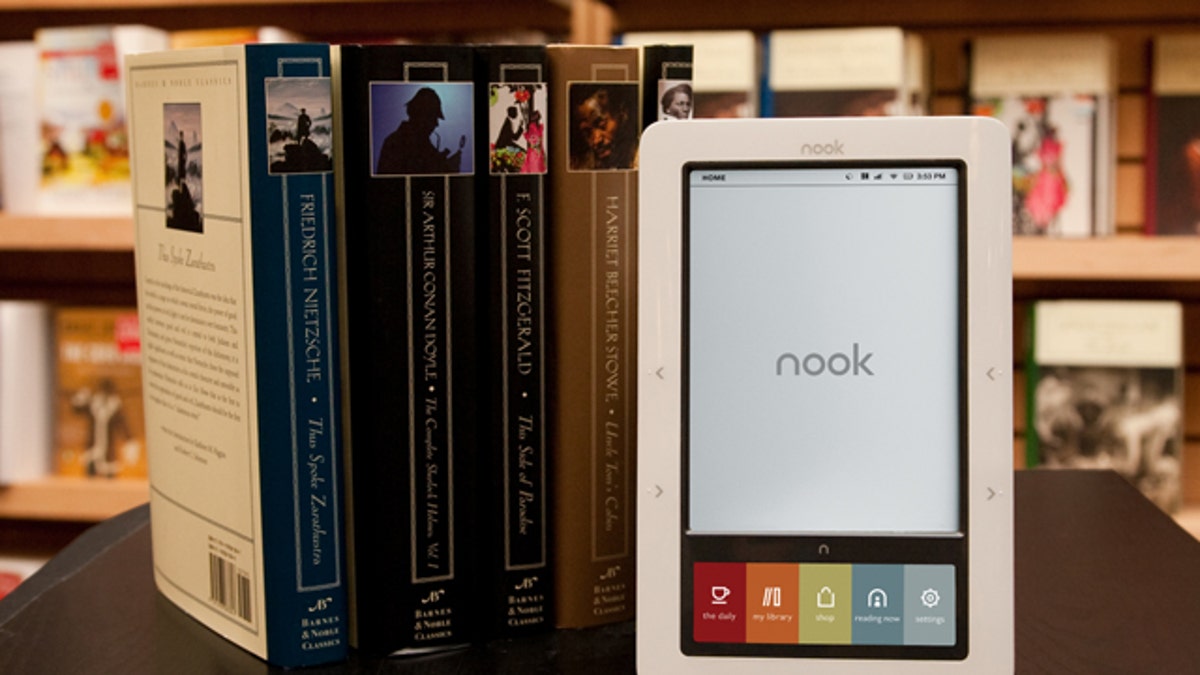
(Barnes & Noble)
Bleeding-edge curiosity. Geek status symbol. Mainstream crowd pleaser. From digital cameras to MP3 players, that's the path every major new category of gadget has followed. And the e-book reader is headed down the same road.
Many tech experts consider this holiday season the year of the e-book reader. But should book lovers splurge on one just yet?
When online mega-merchant Amazon.com unveiled the Kindle in November 2007, it defined the modern e-reader. That original e-book reader sold for $399 and had a 6-inch monochromatic screen so power-efficient that battery life was measured in days, not hours. Despite being svelter than the typical hardcover, the Kindle packed enough memory to store hundreds of digital tomes. And it had built-in wireless networking that made buying books irresistibly fast, easy, and affordable — at just $9.99 a pop for most bestsellers.
The newest Kindle's appeal is much the same as its predecessor, but it's sleeker and sports a zippier display, plus its wireless connection works outside the U.S. Multiple price cuts have brought the cost down to a relatively tempting $259. (Amazon also offers the Kindle DX, a $489 version with a jumbo 9.7-inch screen.)
For two years, the Kindle didn't face much competition. But this year's different. For one thing, Sony, which released its first digital book reader back in the BK (Before Kindle) era, now offers a full line of Readers: The $199 Pocket Edition, the $299 Touch Edition, and the company's first wireless model, the $399 Daily Edition. But the Kindle's most formidable rival to date arrived in early December, when bookstore behemoth Barnes & Noble began shipping its e-reader, the Nook.
SLIDESHOW: Battle of the E-Book Readers
The Nook both mimics the Kindle concept — right down to the $259 price tag — and improves on it. Books are displayed on the same 6-inch screen, but the Nook adds a flashy color touchscreen for input instead of the Kindle's odd, plasticky keyboard. And it uses the same cell-phone network, but the Nook compliments it with faster Wi-Fi networking; starting next year, you'll be able to use that Wi-Fi connection within Barnes & Noble stores to browse books in their entirety, not just sample chapters.
The Nook lets you read books in the "ePub" format, a widely used standard for digital books that Amazon's Kindle doesn't support. It also includes LendMe, a feature that lets you loan an e-book to a friend with a Nook, or anyone who uses B&N's reader software for Windows, Macs, and iPhones.
In its initial incarnation, though, this e-reader is distinctly rough around the edges. When you "flip" its e-pages, the display updates more sluggishly than the Kindle or Sony Reader, and you need to wait while books are formatted, a step which competitors somehow skip. Plus the touchscreen interface sometimes requires more taps on your part than seem necessary. Besides, LendMe, while useful, is limited: You can loan out each book only once, for a fixed two-week period.
Barnes & Noble tells me that it's planning to polish up the Nook experience via a series of software updates, the first of which is being wirelessly delivered to its e-readers this week. But I'd hold off buying one until the updated version is delivered — which is why I don't think it's a tragedy that the device is seriously backordered (orders placed today won't ship until early February).
There are other reasons to pause before plunking down money for any current e-reader. The book business remains skittish about its digital transition, so selection is still spotty for both new titles and older ones. Most bestsellers are available, but not all, and publishers have begun delaying e-versions to protect hardcover sales. That's why memoirs from both Sarah Palin and Ted Kennedy were postponed until Christmas day.
Will the industry come around and embrace electronic distribution? Of course, just as almost everyone in music has with the notable exceptions of the Beatles, Garth Brooks, Kid Rock, and AC/DC. But it's going to take awhile until you can just assume that any book you want to buy is available in e-form.
Postpone your e-reader purchase, and you'll also have more hardware to choose from. A startup called Plastic Logic plans to release details at January's Consumer Electronics Show about its big-screen Que, which will be sold at Barnes & Noble stores. Also coming soon is the EnTourage eDGe, a unique two-screen gadget that claims to be part e-reader, part netbook mini-laptop. And with Amazon's last major overhaul of the Kindle almost ten months old, there's a strong chance a next-generation model isn't far off.
Then there's the hottest product of 2010, which remains a persistent rumor rather than a confirmed reality: The Apple tablet. Just about everybody in the business of watching Steve Jobs' company thinks he'll release a device that resembles a giant iPod Touch — a slick gizmo with a color touchscreen that does music, movies, the Web, apps ... and e-books, one assumes. An Apple tablet wouldn't match the marathon battery life of today's dedicated readers, but it would be infinitely more versatile.
Even if the Apple tablet turns out to be a myth (or at least a late arrival) other tablets will start showing up early next year. In short, even if you're a voracious reader, there's no shame in skipping the 2009 crop of digital book readers. Bide your time a bit longer, and e-reading will only get more alluring — and it won't take long.
Harry McCracken blogs at Technologizer, his site about personal technology. He's also the former editor-in-chief of PC World.
